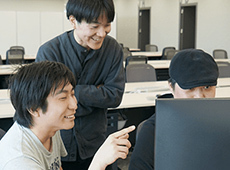Aiming Developer Credo
The Principle of Team vs. Problem and Ensuring “Tsucomibility”
The Principle of Team vs. Problem

In our work, we adhere to a simple principle called the “Team vs. Problem Principle.”
When a problem arises, blaming an individual by saying “it’s their fault” solves nothing.
Moreover, no problem can be solved by one person alone; the entire team must work together to address it.
The “Team vs. Problem Principle” involves confronting problems as a team, without engaging in blame games or witch hunts.
This principle avoids meaningless witch hunts and fosters team cooperation for problem-solving, making it a fundamental policy.
Ensuring “Tsucomibility”
As projects grow larger, it becomes impossible for one person to grasp everything.
Acknowledging this, teams must be built with the understanding that “everyone’s eyes” are crucial.
If everyone is watching, someone will notice mistakes. However, whether these observations are voiced depends on the organization.
Organizations must not foster a sense of resignation, such as “there’s no point in saying anything.”
A moderate level of casualness and friendliness can accelerate problem detection and enhance the team’s robustness.
Comments like “Isn’t this not fun in the first place?” or “Isn’t that wrong?” should be lightly expressed (with appropriate decorum) even to superiors or external parties.
To facilitate this, we gather teams in one place as much as possible and use chat tools to foster a friendly, collaborative atmosphere during development.
At Aiming, we call this “ensuring tsucomibility” and consider it essential for creating enjoyable games.
Project-Oriented Organization